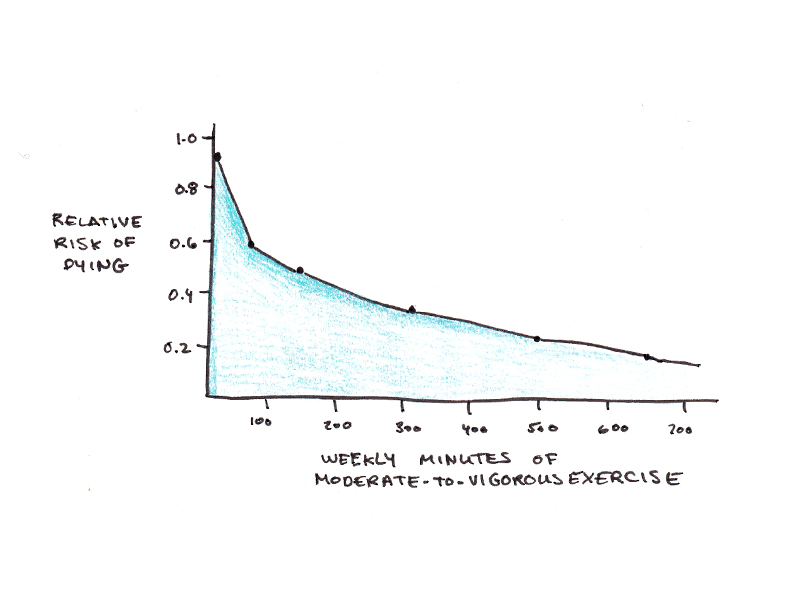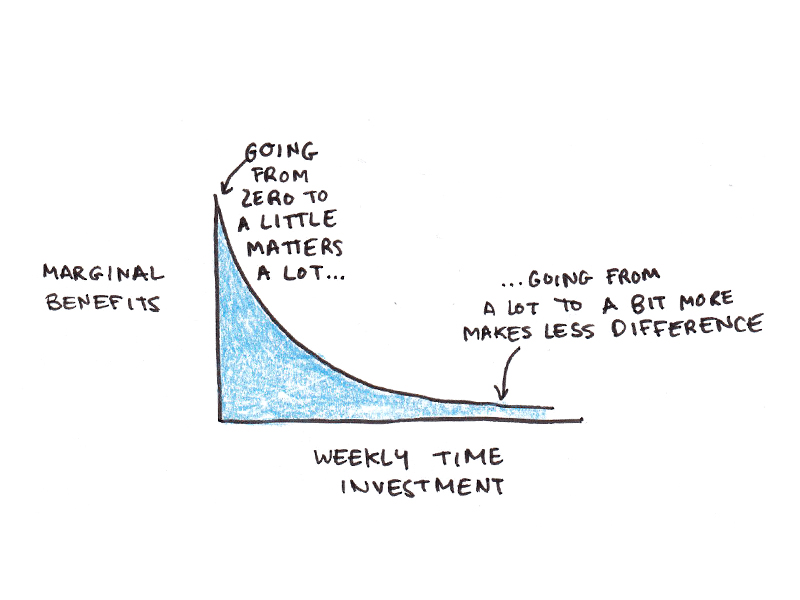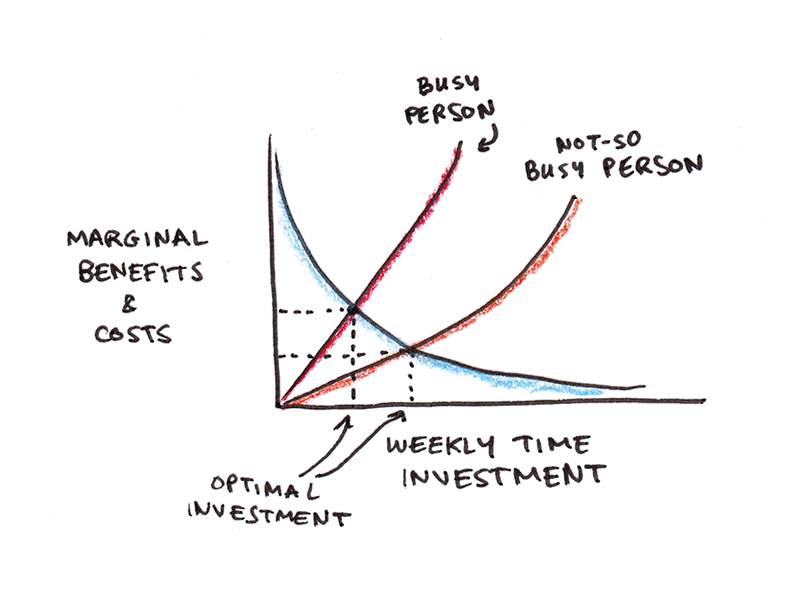I lately completed listening to Wealthy Roll’s memoir, Discovering Extremely, on audiobook. Listening to a few man who accomplished 5 Ironman triathlons in a single week is nice motivation to not wuss out while you’re in the course of a run.
However whereas Roll’s story is undoubtedly inspiring, it acquired me enthusiastic about a central query in my pursuit of constructing higher foundations: how a lot is nice sufficient?
Health, like most foundations, has ample advantages. It makes you more healthy, will increase power, boosts cognition and helps you reside longer. But it appears our brains didn’t evolve to make us wish to train, in order a society, we’re chronically out-of-shape.
The advantages of train kind a traditional diminishing returns curve. Individuals who do zero train profit tremendously from transferring a bit. Individuals who meet advisable minimums nonetheless profit from exercising extra, nevertheless it’s a smaller enchancment than going from no train to some. The widespread recommendation amongst health advocates appears to be, “Some train is nice; extra is healthier.”

However there’s extra to life than simply staying in form.
Even Roll, for all his unbelievable accomplishments, famous most of the drawbacks his intensive coaching initially generated: his concentrate on coaching led to the decline of his authorized follow, placing his household via monetary challenges, and his spouse needed to handle a bigger share of the family work. Roll turned his success right into a best-selling ebook and fashionable podcast. However for the remainder of us, health is a side-hustle, not a profession.
The query isn’t restricted to train. A number of years in the past, I went on a ten-day meditation retreat. When the retreat completed, it was impressed upon us that the best way to take care of our newfound psychological readability was to meditate for 2 hours each single day.
How do you get the steadiness proper? How do you resolve how a lot to spend money on a basis, and when do you resolve you’re already doing sufficient?
Right here’s The Flawed Option to Reply This Query
Let’s begin with how we sometimes make choices of this type: we glance round us, see what different persons are doing, and decide primarily based on what sort of funding appears “regular.”
Delegating choices of this type may be adaptive in lots of areas of life. The cultural evolution speculation argues that cultures can undertake useful practices with out essentially having a superb rationale for his or her existence.
Indigenous farmers realized to combine small quantities of ash into corn when cooking it, which prevents niacin deficiency. Europeans who introduced corn again as a meals crop usually suffered from pellagra owing to their lack of this system. But neither group knew something about nutritional vitamins. Cultural practices evolve, and thus, social norms can embody knowledge.
Nonetheless, cultural evolution and the sluggish embedding of knowledge into practices take a very long time, and our surroundings has reworked shortly. Persevering with the instance of health, few conventional cultures share our fashionable idea of train, regardless of the overwhelming proof that the majority of us should do extra of it. Till lately, every day life was sufficient to maintain in comparatively fine condition.
Thus, wanting round you and seeing what others are doing, whereas a superb long-run technique, will fail in precisely these circumstances the place our surroundings has modified too quickly for organic and cultural evolution to catch up. For every of the foundations I listed final week, there’s such a narrative that explains why we underinvest.
What’s a Higher Option to Resolve How A lot is Sufficient?
The right method to make these varieties of choices about tradeoffs comes from economics. The components is comparatively easy, even when the portions concerned are tougher to calculate:
- Add up all the advantages of investing a further unit of time, effort, consideration or cash.
- Add up all the prices of spending these sources, together with the chance price of doing one thing else.
- Proceed investing extra within the basis till further prices equal further advantages.
To contemplate this, let’s return to our health instance. What are the advantages of train? Well being is the obvious, however there’s additionally elevated power, cognition, temper and, in fact, wanting good.
Bodily well being is probably the best to quantify since there are a lot of research taking a look at mortality charges, coming from epidemiological work taking a look at cohorts of people who fluctuate of their health ranges.1
To this curve, we have to add the opposite advantages of train. Simplifying it a bit, we get one thing that appears like this—every further minute of train brings a whole lot of advantages at first, slowing down over time as the amount will increase:

What about prices? Train sufficient and the willpower wanted to train turns into fairly modest. Whereas you may get injured throughout train, common train additionally prevents accidents by strengthening bones and joints, so so long as the exercises don’t ramp up too shortly, that is most likely a internet profit moderately than a price. This leaves the principle price because the time required to work out.
Though the advantages of train are comparatively common, the associated fee equation does change for various folks. For those who work two jobs, have six children and research on weekends, a further half an hour for something is extremely pricey. Conversely, if you happen to’re single and solely work part-time, it’s possible you’ll discover it straightforward to spend hours every week on tv or video video games with out a lot impression on the remainder of your life.
Prices are likely to go up as you spend extra. Doing one minute of train per day requires nearly no sacrifice. However the worth will get larger as you could reduce into extra invaluable various actions to seek out time. For a busier individual, this rise is steeper, since there may be comparatively much less “slack” in her schedule:

Discovering Steadiness
Really calculating the optimum crossover level the place further advantages equal prices is tough to do in follow. Lots of the prices don’t have any shared customary of measure, and it could be exhausting to get correct figures for, say, the precise impression of an additional ten minutes of train on mind well being.
However simply because we will’t discover a precise outcome doesn’t imply this evaluation is ineffective.
As a substitute, I’d argue that we will do an off-the-cuff model of this considering each time we make choices about how a lot we should always, ideally, spend money on every basis:
- What’s the further good thing about doing extra on this basis?
- What’s the alternative price? What would I’ve to cease doing to make that funding?
- Is the commerce price it within the long-run?
Lengthy-run prices and advantages are what’s most vital to this calculation. Most foundations have substantial upfront investments, even when the continuing prices are fairly cheap. This may be as a result of it takes awhile to get a system up and operating, equivalent to while you begin a brand new productiveness system or begin investing. However, sometimes, the preliminary prices are excessive as a result of investing in that basis isn’t a behavior and thus requires a whole lot of consideration and self-control to implement.
Nonetheless, when you pay these fastened prices, you may reap the advantages of robust foundations for the rather more modest “upkeep” prices. Most individuals who’ve a superb productiveness system, strong monetary portfolio or wholesome consuming habits aren’t expending a whole lot of time and power to maintain them.
One justification I can see for partaking in a critical effort to construct foundations over time is that it lets you push nearer to the true optimum level. When you recover from the preliminary limitations of setup and habituation, you may reap the rewards with a lot much less effort.
Footnotes
- A significant concern with epidemiological research is separating causation and correlation. Does train trigger folks to stay longer (causation), or do different variables trigger each train and good well being (correlation)? Most likely a few of each, however a number of converging strains of proof that don’t endure from this drawback counsel that the impact of train on well being is causal.

